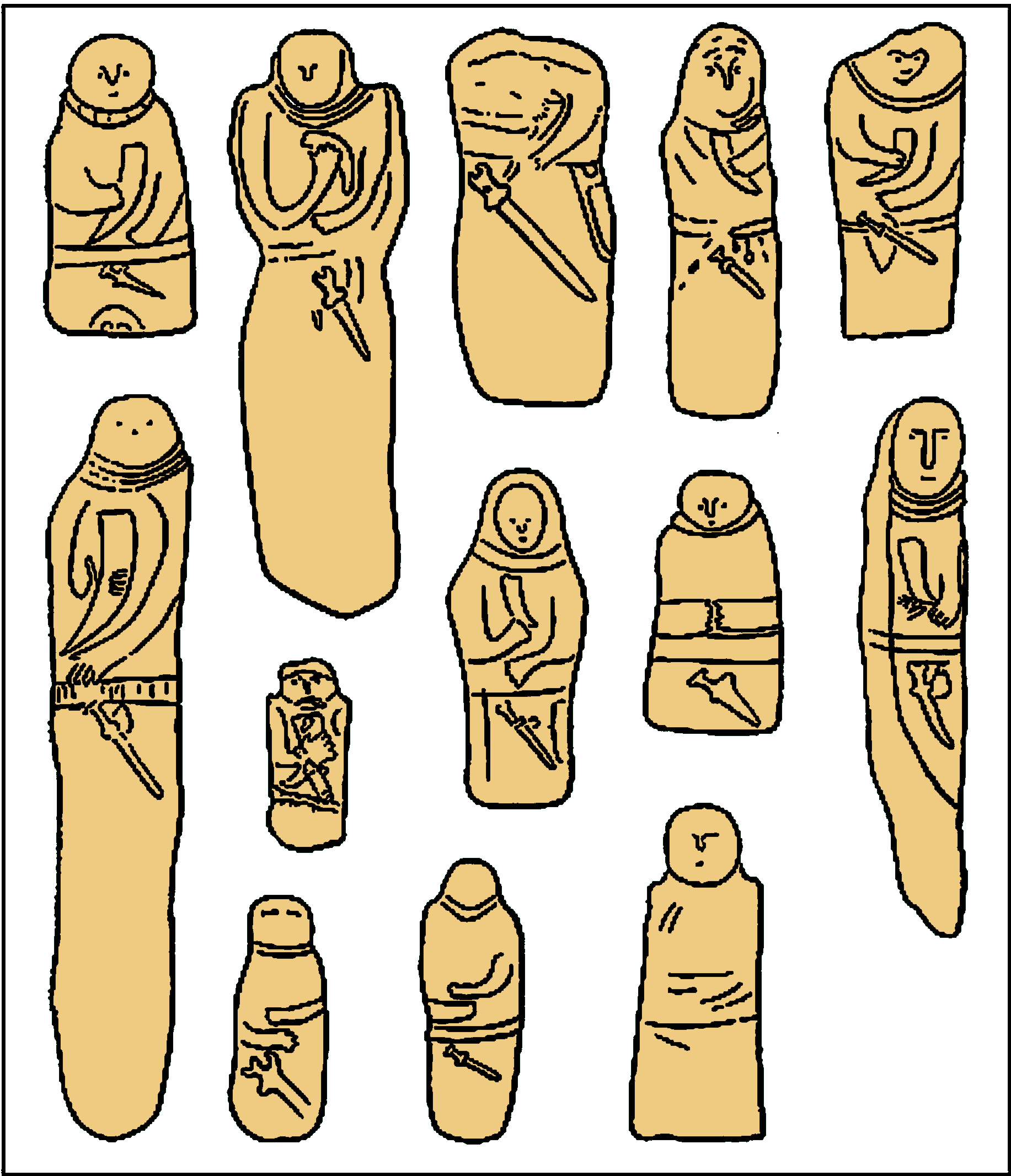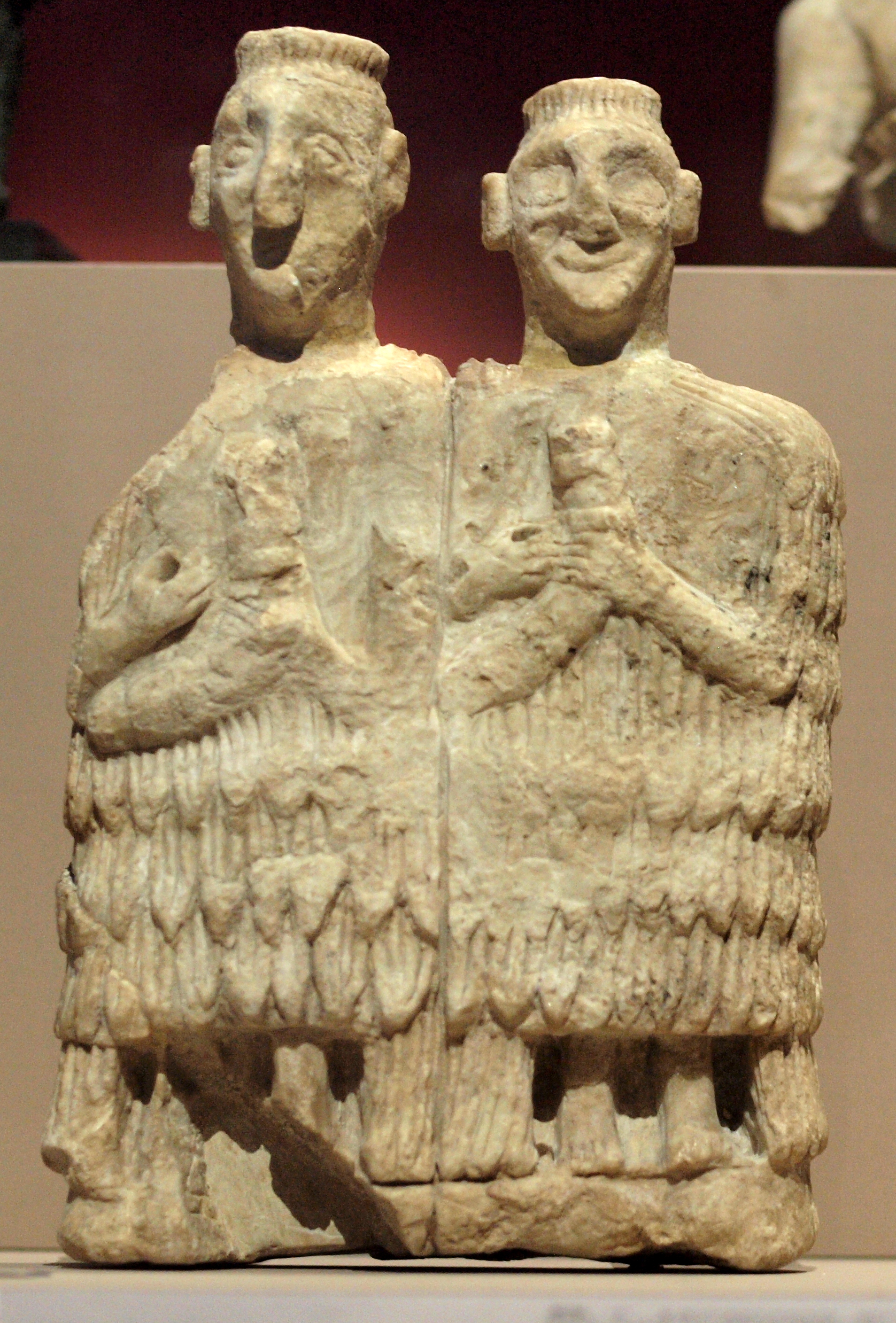|
Enarei
The ''Enarei'', singular Enaree ( grc, Ἐνάρεες , , derived from the Iranian term , meaning "unmanly"), were Scythian androgynous/effeminate priests and shamanistic soothsayers who played an important role in the Scythian religion. Religious role The Enarei performed Artimpasa's cult and played an important political role in Scythian society as they were believed to have received the gift of prophesy directly from the goddess Artimpasa (conflated by Herodotus with Aphrodite). The Enarei wore women's clothing, performed women's jobs and customs and spoke in a feminine manner. They were accepted and revered in Scythian society. Scythian religion included shamanism and divination, both nature and deities worship and had no temples. Scythian shamanism involved religious ecstasy through the use of cannabis, with modern authors claiming that Enarei likely performed those rites, just like 'gender-crossing shamans' of other cultures. Divination Herodotus describes the Scythi ... [...More Info...] [...Related Items...] OR: [Wikipedia] [Google] [Baidu] |
Scythians
The Scythians or Scyths, and sometimes also referred to as the Classical Scythians and the Pontic Scythians, were an Ancient Iranian peoples, ancient Eastern Iranian languages, Eastern * : "In modern scholarship the name 'Sakas' is reserved for the ancient tribes of northern and eastern Central Asia and Eastern Turkestan to distinguish them from the related Massagetae of the Aral region and the Scythians of the Pontic steppes. These tribes spoke Iranian languages, and their chief occupation was nomadic pastoralism." * : "Near the end of the 19th century V.F. Miller (1886, 1887) theorized that the Scythians and their kindred, the Sauromatians, were Iranian-speaking peoples. This has been a popular point of view and continues to be accepted in linguistics and historical science [...]" * : "From the end of the 7th century B.C. to the 4th century B.C. the Central- Eurasian steppes were inhabited by two large groups of kin Iranian-speaking tribes – the Scythians and Sarmatians [.. ... [...More Info...] [...Related Items...] OR: [Wikipedia] [Google] [Baidu] |
Scythian Religion
The Scythian religion refers to the mythology, ritual practices and beliefs of the Scythian cultures, a collection of closely related ancient Iranian peoples who inhabited Central Asia and the Pontic–Caspian steppe in Eastern Europe throughout Classical Antiquity, spoke the Scythian languages, Scythian language (itself a member of the Eastern Iranian languages, Eastern Iranian languages, Iranian language family), and which included the Scythians, Scythians proper, the Cimmerians, the Sarmatians, the Alans, the Sindi (people), Sindi, the Massagetae and the Saka. The Scythian religion is assumed to have been related to the earlier Proto-Indo-Iranian religion as well as to contemporary Eastern Iranian and Ossetian mythology, Ossetian traditions, and to have influenced later Slavic mythology, Slavic, Hungarian mythology, Hungarian and Turkic mythology, Turkic mythologies. Development The Scythian religion was of Ancient Iranian religion, Iranian origin. The religion was influenced ... [...More Info...] [...Related Items...] OR: [Wikipedia] [Google] [Baidu] |
Gay Sexual Practices
Gay sexual practices are sexual activities involving men who have sex with men (MSM), regardless of their sexual orientation or sexual identity. These practices can include anal sex, non-penetrative sex, and oral sex. Evidence shows that sex between men is significantly underreported in surveys. Behaviors Various sex positions may be performed during sexual activity between men. Evidence shows that sex between men is significantly underreported in surveys due to social desirability bias. Anal sex Historically, anal sex has been popularly associated with male homosexuality and MSM. Many MSM, however, do not engage in anal sex, and may engage in oral sex, frottage or frot, or mutual masturbation instead. Among men who have anal sex with other men, the insertive partner may be referred to as the ''top'', the one being penetrated may be referred to as the ''bottom'', and those who enjoy either role may be referred to as '' versatile''. When MSM engage in anal sex without usin ... [...More Info...] [...Related Items...] OR: [Wikipedia] [Google] [Baidu] |
Third Gender
Third gender is a concept in which individuals are categorized, either by themselves or by society, as neither man nor woman. It is also a social category present in societies that recognize three or more genders. The term ''third'' is usually understood to mean "other", though some anthropologists and sociologists have described fourth and fifthGraham, Sharyn (2001)Sulawesi's fifth gender Inside Indonesia, April–June 2001. genders. The state of personally identifying as, or being identified by society as, a man, a woman, or other, is usually also defined by the individual's gender identity and gender role in the particular culture in which they live. Most cultures use a gender binary, having two genders (boys/men and girls/women).Kevin L. Nadal, ''The SAGE Encyclopedia of Psychology and Gender'' (2017, ), page 401: "Most cultures currently construct their societies based on the understanding of gender binary—the two gender categorizations (male and female). Such societies ... [...More Info...] [...Related Items...] OR: [Wikipedia] [Google] [Baidu] |
Galli
A ''gallus'' (pl. ''galli'') was a eunuch priest of the Phrygian goddess Cybele (Magna Mater in Rome) and her consort Attis, whose worship was incorporated into the state religious practices of ancient Rome. Origins Cybele's cult may have originated in Mesopotamia, arriving in Greece around 300 BCE. It originally kept its sacred symbol, a black meteorite, in a temple called the Megalesion in Pessinus in modern Turkey. The earliest surviving references to the galli come from the ''Greek Anthology'', a 10th-century compilation of earlier material, where several epigrams mention or clearly allude to their castrated state. Stephanus Byzantinus (6th century CE) said the name came from King Gallus, while Ovid (43 BC – 17 CE) said it derived from the Gallus river in Phrygia. The same word (''gallus'' singular, ''galli'' plural) was used by the Romans to refer to Celts and to roosters, and the latter especially was a source of puns. Arrival in Rome The cult of Magna Mater arrive ... [...More Info...] [...Related Items...] OR: [Wikipedia] [Google] [Baidu] |
Gala (priests)
The Gala ( Sumerian: ''gala'', Akkadian: ''kalû'') were priests of the Sumerian goddess Inanna. They made up a significant number of the personnel of both temples and palaces, the central institutions of Mesopotamian city states. Originally specialists in singing lamentations, gala appear in temple records dating back from the middle of the 3rd millennium BC. According to an old Babylonian text, Enki created the gala specifically to sing "heart-soothing laments" for the goddess Inanna. Cuneiform references indicate the gendered character of the role. Lamentation and wailing may have originally been female professions, so that the men who entered the role adopted its forms. Their hymns were sung in a Sumerian dialect known as ''eme-sal'', normally used to render the speech of female gods, and some gala took female names. Homosexual proclivities are implied by the Sumerian proverb which reads, "When the gala wiped off his anus e said ‘I must not arouse that which belongs to my ... [...More Info...] [...Related Items...] OR: [Wikipedia] [Google] [Baidu] |
Impotency
Erectile dysfunction (ED), also called impotence, is the type of sexual dysfunction in which the penis fails to become or stay erect during sexual activity. It is the most common sexual problem in men.Cunningham GR, Rosen RC. Overview of male sexual dysfunction. In: UpToDate, Martin KA (Ed), UpToDate, Waltham, MA, 2018. Through its connection to self-image and to problems in sexual relationships, erectile dysfunction can cause psychological harm. In about 80% of cases, physical causes can be identified. These include cardiovascular disease; diabetes mellitus; neurological problems, such as those following prostatectomy; hypogonadism; and drug side effects. About 10% of cases are psychological impotence, caused by thoughts or feelings; here, there is a strong response to placebo treatment. The term ''erectile dysfunction'' is not used for other disorders of erection, such as priapism. Treatment involves addressing the underlying causes, lifestyle modifications, and addre ... [...More Info...] [...Related Items...] OR: [Wikipedia] [Google] [Baidu] |
On Airs, Waters, Places
On, on, or ON may refer to: Arts and entertainment Music * On (band), a solo project of Ken Andrews * ''On'' (EP), a 1993 EP by Aphex Twin * ''On'' (Echobelly album), 1995 * ''On'' (Gary Glitter album), 2001 * ''On'' (Imperial Teen album), 2002 * ''On'' (Elisa album), 2006 * ''On'' (Jean album), 2006 * ''On'' (Boom Boom Satellites album), 2006 * ''On'' (Tau album), 2017 * "On" (song), a 2020 song by BTS * "On", a song by Bloc Party from the 2006 album ''A Weekend in the City'' Other media * ''Ön'', a 1966 Swedish film * On (Japanese prosody), the counting of sound units in Japanese poetry * ''On'' (novel), by Adam Roberts * ONdigital, a failed British digital television service, later called ITV Digital * Overmyer Network, a former US television network Places * On (Ancient Egypt), a Hebrew form of the ancient Egyptian name of Heliopolis * On, Wallonia, a district of the municipality of Marche-en-Famenne * Ahn, Luxembourg, known in Luxembourgish as ''On'' * Ontario, a ... [...More Info...] [...Related Items...] OR: [Wikipedia] [Google] [Baidu] |
Hippocrates
Hippocrates of Kos (; grc-gre, Ἱπποκράτης ὁ Κῷος, Hippokrátēs ho Kôios; ), also known as Hippocrates II, was a Greek physician of the classical period who is considered one of the most outstanding figures in the history of medicine. He is traditionally referred to as the "Father of Medicine" in recognition of his lasting contributions to the field, such as the use of prognosis and clinical observation, the systematic categorization of diseases, or the formulation of humoral theory. The Hippocratic school of medicine revolutionized ancient Greek medicine, establishing it as a discipline distinct from other fields with which it had traditionally been associated (theurgy and philosophy), thus establishing medicine as a profession. However, the achievements of the writers of the Hippocratic Corpus, the practitioners of Hippocratic medicine, and the actions of Hippocrates himself were often conflated; thus very little is known about what Hippocrates actually t ... [...More Info...] [...Related Items...] OR: [Wikipedia] [Google] [Baidu] |
Askelon
Ashkelon or Ashqelon (; Hebrew: , , ; Philistine: ), also known as Ascalon (; Ancient Greek: , ; Arabic: , ), is a coastal city in the Southern District of Israel on the Mediterranean coast, south of Tel Aviv, and north of the border with the Gaza Strip. The ancient seaport of Ashkelon dates back to the Neolithic Age. In the course of its history, it has been ruled by the Ancient Egyptians, the Canaanites, the Philistines, the Assyrians, the Babylonians, the Greeks, the Phoenicians, the Hasmoneans, the Romans, the Persians, the Arabs and the Crusaders, until it was destroyed by the Mamluk Sultanate (Cairo), Mamluks in 1270. The modern city was originally located approximately 4 km inland from the ancient site, and was known as al-Majdal or al-Majdal Asqalan (Arabic: ''al-Mijdal''; Hebrew: ''ʾĒl-Mīǧdal''). In 1918, it became part of the British Occupied Enemy Territory Administration and in 1920 became part of Mandatory Palestine. Al-Majdal on the eve of the 1948 Ara ... [...More Info...] [...Related Items...] OR: [Wikipedia] [Google] [Baidu] |
Aphrodite Urania
Aphrodite Urania ( grc, Ἀφροδίτη Οὐρανία, Aphrodítē Ouranía) was an epithet of the Greek goddess Aphrodite, signifying "heavenly" or "spiritual", to distinguish her from her more earthly aspect of Aphrodite Pandemos, "Aphrodite for all the people". The two were used (mostly in literature) to differentiate the more "celestial" love of body and soul from purely physical lust. Plato represented her as a daughter of the Greek god Uranus, conceived and born without a mother. According to Hesiod, she was born from the severed genitals of Uranus and emerged from the sea foam. Urania and Pandemos Aphrodite Pandemos was originally an extension of the idea of the goddess Aphrodite to family and city life to include the whole people, the political community. Hence the name was supposed to go back to the time of Theseus, the reputed author of the reorganization of Attica and its demes. Aphrodite Pandemos was held in equal regard with Urania; she was called σεμνή ' ... [...More Info...] [...Related Items...] OR: [Wikipedia] [Google] [Baidu] |







